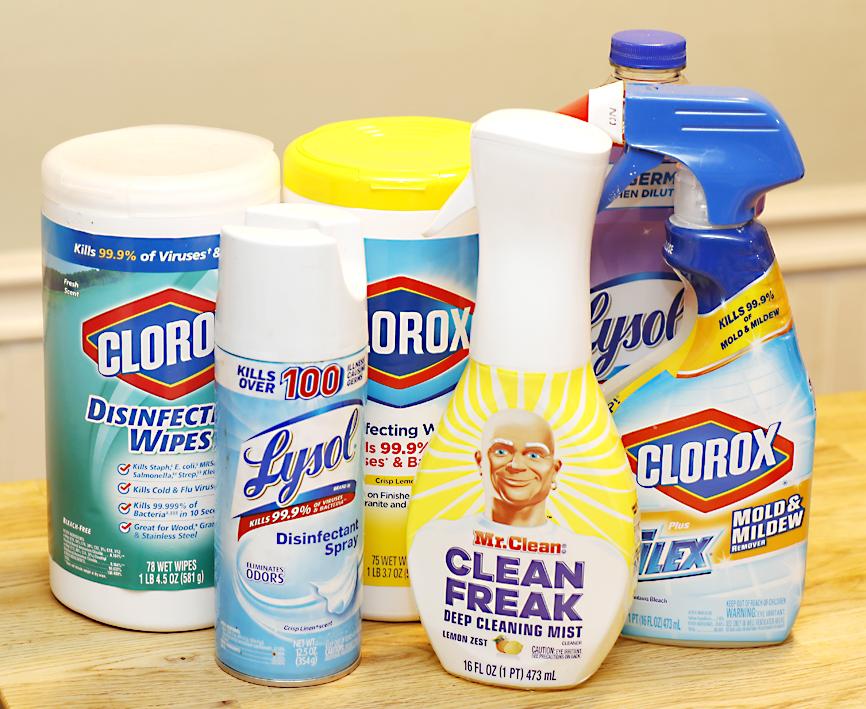Makers of household cleaners on Friday took the unusual step of urging people not to drink or inject their products, after US President Donald Trump suggested that researchers try using them to cure COVID-19 patients.
Reckitt Benckiser, the UK-based maker of Lysol and Dettol, issued the first warning, saying: “Under no circumstance should our disinfectant products be administered into the human body (through injection, ingestion or any other route).”
Clorox, maker of bleach, soon followed, calling it critical for consumers to understand the facts.

Photo: EPA-EFE
“Bleach and other disinfectants are not suitable for consumption or injection under any circumstances,” it said.
The comments came after Trump said at a Thursday news briefing that scientists should explore whether inserting ultraviolet light or disinfectant into the bodies of people infected with the disease caused by the novel coronavirus would help.
“Is there a way we can do something like that by injection, inside, or almost a cleaning?” he said. “It would be interesting to check that.”
Trump later said he was being sarcastic, after his comments sparked swift and fierce rebuke from the international medical community and others concerned that people might poison themselves by ingesting products with harmful chemicals.
“We have a responsibility as a company to make sure people are using our products as intended and are following the guidance on the label and not unintentionally misusing them because of different suggestions,” a Reckitt spokeswoman told reporters. “We wanted to make sure nobody misinterpreted his comments.”
Lou Colasuonno, who specializes in crisis communications, said speaking up was the right thing to do, even if it risked White House retribution for contradicting the US president.
“If they’d been quiet during this, it could be construed as acquiescence,” said Colasuonno, a senior managing director at FTI Consulting.
Lysol toilet bowl cleaner’s warning states: “Corrosive. Causes irreversible eye damage and skin burns. Harmful if swallowed. Do not get in eyes, on skin or on clothing.”
Meanwhile, Procter & Gamble, maker of Comet cleaner and Dawn detergent, referred to a statement from the American Cleaning Institute that “disinfectants are meant to kill germs or viruses on hard surfaces. Under no circumstances should they ever be used on one’s skin, ingested or injected internally.”
William Marler, a food safety lawyer in Seattle, said that manufacturers could face legal liability if consumers who did not know better misused their products, likening the companies’ statements to “president-proofing your product.”
“The law would presume that a reasonable person wouldn’t be consuming a product, despite what the president said,” Marler said.
Frank Vandall, a professor at Emory University School of Law in Atlanta, said the argument that people know better was weakened by Trump’s comments.
“There are many people who could say that if the president says it, poof, that’s good enough for me,” he said. “The messenger is enormously important.”
Mark Geistfeld, a New York University law professor specializing in product liability, said a plaintiff must prove a manufacturer failed to adequately disclose the risks, which it could accomplish with a “do not ingest” warning on the label.
“An adequate warning does not have to say: ‘Do not ingest, even if recommended by the president.’”

Indonesia yesterday began enforcing its newly ratified penal code, replacing a Dutch-era criminal law that had governed the country for more than 80 years and marking a major shift in its legal landscape. Since proclaiming independence in 1945, the Southeast Asian country had continued to operate under a colonial framework widely criticized as outdated and misaligned with Indonesia’s social values. Efforts to revise the code stalled for decades as lawmakers debated how to balance human rights, religious norms and local traditions in the world’s most populous Muslim-majority nation. The 345-page Indonesian Penal Code, known as the KUHP, was passed in 2022. It

‘DISRESPECTFUL’: Katie Miller, the wife of Trump’s most influential adviser, drew ire by posting an image of Greenland in the colors of the US flag, captioning it ‘SOON’ US President Donald Trump on Sunday doubled down on his claim that Greenland should become part of the US, despite calls by the Danish prime minister to stop “threatening” the territory. Washington’s military intervention in Venezuela has reignited fears for Greenland, which Trump has repeatedly said he wants to annex, given its strategic location in the arctic. While aboard Air Force One en route to Washington, Trump reiterated the goal. “We need Greenland from the standpoint of national security, and Denmark is not going to be able to do it,” he said in response to a reporter’s question. “We’ll worry about Greenland in

PERILOUS JOURNEY: Over just a matter of days last month, about 1,600 Afghans who were at risk of perishing due to the cold weather were rescued in the mountains Habibullah set off from his home in western Afghanistan determined to find work in Iran, only for the 15-year-old to freeze to death while walking across the mountainous frontier. “He was forced to go, to bring food for the family,” his mother, Mah Jan, said at her mud home in Ghunjan village. “We have no food to eat, we have no clothes to wear. The house in which I live has no electricity, no water. I have no proper window, nothing to burn for heating,” she added, clutching a photograph of her son. Habibullah was one of at least 18 migrants who died

Russia early yesterday bombarded Ukraine, killing two people in the Kyiv region, authorities said on the eve of a diplomatic summit in France. A nationwide siren was issued just after midnight, while Ukraine’s military said air defenses were operating in several places. In the capital, a private medical facility caught fire as a result of the Russian strikes, killing one person and wounding three others, the State Emergency Service of Kyiv said. It released images of rescuers removing people on stretchers from a gutted building. Another pre-dawn attack on the neighboring city of Fastiv killed one man in his 70s, Kyiv Governor Mykola